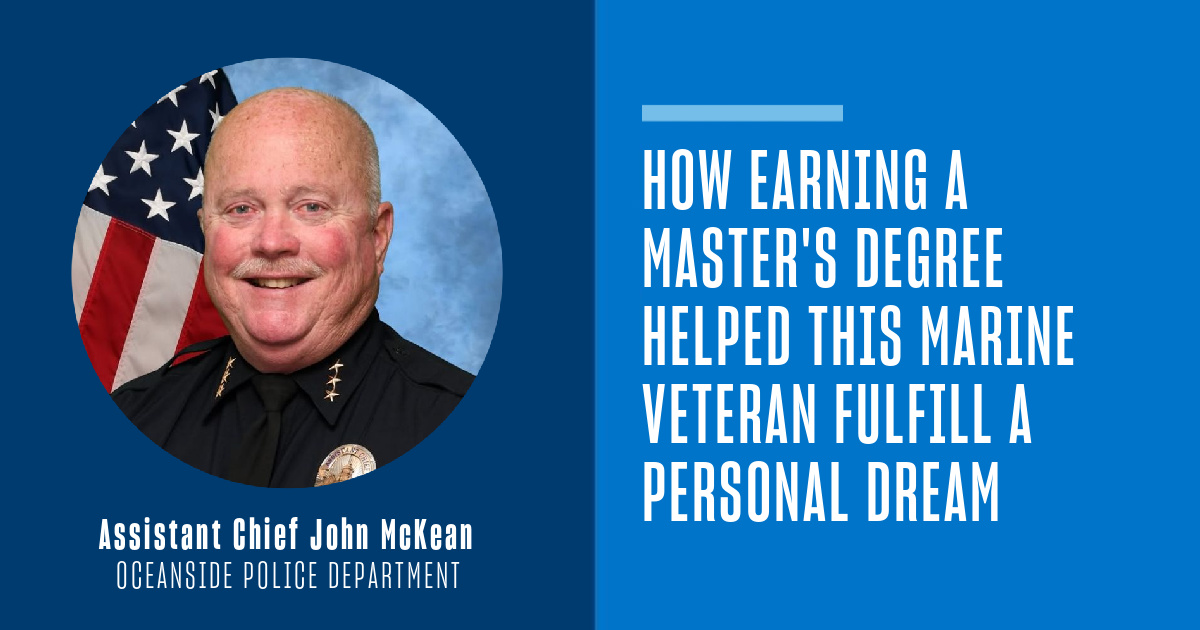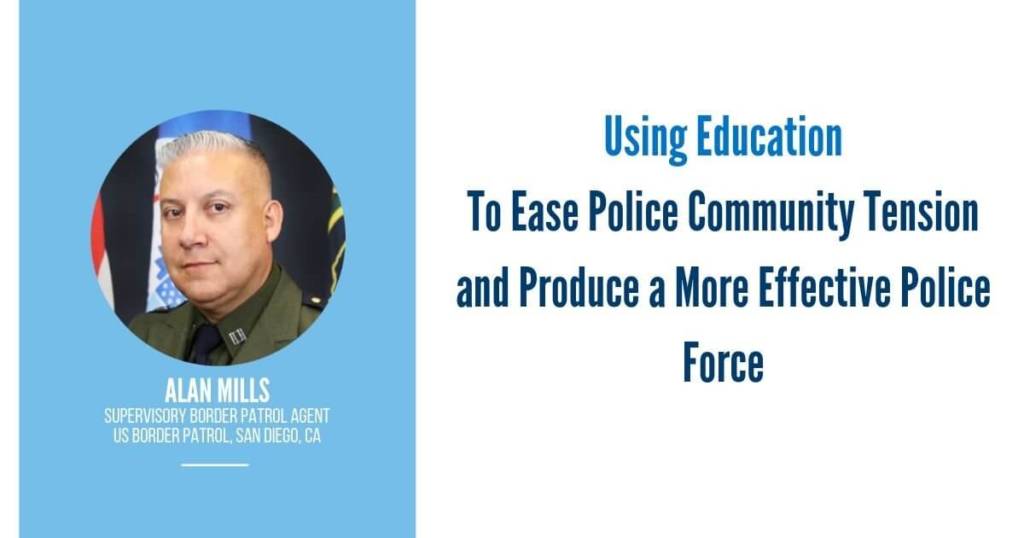John McKean spent 20 years in the Marines before embarking on his law enforcement career in 2003. He has worked on large scale investigations as a member of the North County Regional Gang Task Force (NCRGTF) in San Diego County and currently serves as Assistant Chief of Police for the Oceanside (CA) Police Department.
How did you start your career in law enforcement?
I used to teach skydiving and worked with a pilot who was also a reserve captain in the police department. We would talk a lot and at some point he talked me into becoming a reserve cop. I started going on some ride-alongs with him and eventually I got into the academy. By this time I had a young family, and heading out for a few months at a time as a Marine wasn’t as much fun as it used to be. So I retired from the Marines after 20 years and moved into law enforcement.
Why did you decide to pursue the Master’s Degree in Law Enforcement and Public Safety Leadership?
I’m a little bit older than the majority of the guys I work with. I didn’t complete my bachelor’s degree until 2015 when I was well into my career. Furthering my education and getting my master’s degree was something I always wanted to do. When I enrolled, I wanted to show my 15-year-old son how much education meant to me and to set the example. The opportunity to earn my master’s online through USD presented itself I jumped on it.
My goal was to advance my law enforcement career by being promoted through the ranks, and having a master’s degree —especially one from a top ranked university like USD — has helped me assume greater leadership responsibility.
The program at USD was very focused on law enforcement leadership, and the curriculum was contemporary. It was all relative to what we do every day in the field. I loved that aspect of it.
Why did you choose to pursue your master’s at USD?
USD has a great reputation, and throughout my degree program I found it lived up to that reputation. Plus, it made sense financially – it was within the budget I could afford, when taking into consideration my GI bill and the tuition reimbursement from my department.
What did you like best about the online Law Enforcement and Public Safety Leadership program?
What I liked —and talked about almost every day at work — was how relevant the curriculum was to what we were actually doing in the field. I remember being able to take the paper I wrote for class one week into my department the next week and hand it over to the chief and say “hey, we should really take a look at this policy.”
We had law enforcement professionals from all over the country in the program. So it’s not just the professors we learned from but each other. Students in the program have varying levels of experience – from early career cops and professional staff to law enforcement leaders who have been in the field for 30 years. As a student in the LEPSL program you get the best of both worlds – real world law enforcement and academia, from all over the country, every week, right on your computer.
Did you have any challenges balancing the degree program with your job responsibilities and family life?
The LEPSL workload was challenging but not overwhelming. It is a 20-month program and each course is only 7 weeks long, so it goes by fast. You have to commit to it but, since you only take one class at a time, you can fit it into your schedule and really focus on the material.
How did the LEPSL program help your career?
I was promoted to sergeant after I graduated with my MS LEPSL degree. I worked as Detective Sergeant in the Property and Financial Crimes Unit and was a member and supervisor of the Special Weapons and Tactics Team, as well as a Crisis Negotiator. I then promoted to Lieutenant in December 2020 and advanced to Captain in April 2023, leading the Investigations Division. I have had the opportunity to attend the FBI National Academy (Session 284) and was recently promoted to Assistant Chief (December 2024).
How did you feel about the online component of the LEPSL program?
Being able to take all the classes online was a big part of the decision for me. I don’t mind going to a class but I also have a family and a full-time job. The online component is a huge selling point for cops like me because we have changing and often unpredictable work schedules. Enrolling in a master’s program is a big commitment, but the online aspect allowed me to fit it in.
What skills did you develop in the LEPSL program, and how did those skills help you in you role?
My writing skills improved greatly throughout the program. I learned how to more effectively articulate my thoughts in a condensed format that is not boring to read but still covers all the key points. Writing is a large part of any law enforcement job – writing reports, memos, and evaluations. Now I am able to write something in two pages that previously would have taken me 10. The professional writing skills I gained is one of the biggest things I took away from this program.
Why do you think education is important for police officers and those in law enforcement positions?
The law enforcement field has changed quite a bit in recent years. It used to be you didn’t need a whole lot of education. But every profession evolves and you need to be able to evolve with it. For most of us cops that can be difficult — cops hate change. Education is so important today, especially with all the scrutiny that law enforcement is put under. Being better educated will help you back-up the decisions you make on a daily basis in the field.
What advice would you give to someone working in law enforcement who is considering a Master’s degree?
If you’re currently working in law enforcement and looking to be promoted, the Law Enforcement and Public Safety Leadership master’s degree program at University of San Diego is definitely going to put you a step above everybody else. The information is relevant and the curriculum is up-to-date and contemporary. Throughout the program we explored and discussed real world issues such as how Supreme Court decisions are made. If you want to advance your law enforcement career and move into a leadership role as a sergeant, captain, or commander this program is right for you.





